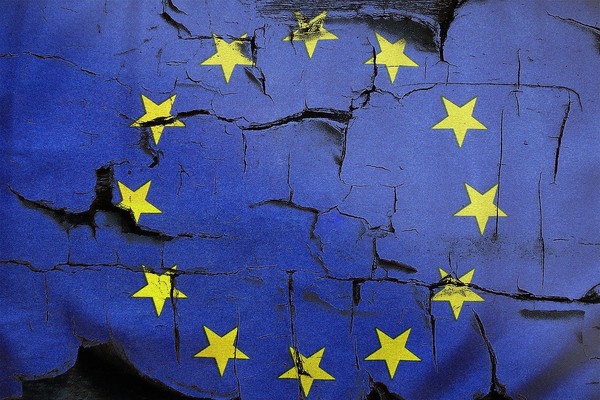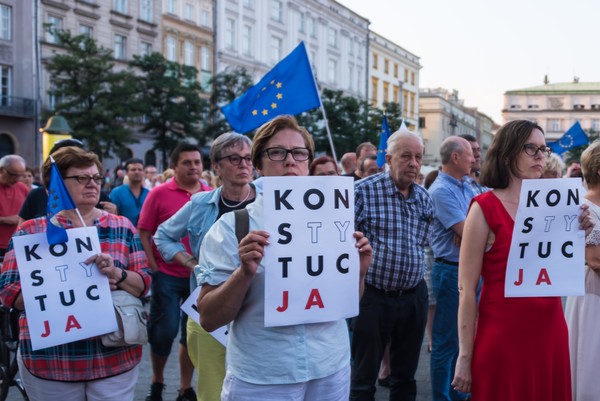Authoritarian regimes and illiberal ideals gain ground

IN RECENT years, numerous countries in the European Union (EU) have experienced the rise of the far-right wing in mainstream politics. For most political analysts, this pattern diverges from the EU’s purpose and talking points of commitment to democracy and freedom of all its citizens. With an increasing number of people voting for candidates with radical right-wing political leanings, experts believe that the subsequent rise of authoritative governments or illiberal democracies will be the new trend in Europe[1]. While Western Europe is signaling its growing affinity for radical right-wing idealism in mainstream politics, it did succeed in maintaining traditional democracies. However, other EU members in central and eastern regions have not been as successful in resisting the rise of authoritarianism mainly due to their historical roots, disputes over certain European values, and economic turmoil. Hungary, Poland, and Bulgaria are just a few of the nations where democratic values are on the decline, and ruling governments are championing restrictions on free elections, the judicial system, and the economy––receiving mixed reactions from citizens.
Hungary’s illiberal democracy
According to Freedom House[2], Hungary is not officially classified as a democracy[3]. The Hungarian government is termed a “hybrid regime,” mainly due to Hungarian Prime Minister Viktor Orbán’s authoritative rule and continued disregard for democratic processes and institutions. Orbán, a self-described illiberal democrat, easily secured a fifth term as Prime Minister of Hungary against a united opposition coalition in early 2022. His political party Fidesz’s overwhelming parliamentary majority also reflects his far-right policies’ steadfast resonance with the people[4]. However, election security experts have criticized Orbán for skewing the election in his favor by manipulating democratic processes. For instance, they assert that Hungarian elections are classified as free but not fair. This is an important distinction to make because the latter evokes Fidesz’s control over the distribution of media coverage and advertising for each party during elections. During the 2022 elections, the opposition was given only five minutes of airtime, which is the legal minimum. The ruling party, on the other hand, holds a monopoly over more than 90% of the media, including TV advertisements, radio, and printed news. Fidesz also used government funds and official platforms to promote its political campaign and messages, an advantage that the opposition did not have. In addition, over the years, Fidesz has engaged in gerrymandering by manipulating electoral districts to favor its chances of electoral victories over the opposition’s chances in certain constituencies. The suppression of the media and a rigged electoral system are classic indicators of authoritarian rule. However, given the popular support for the ruling party, the set-up of elections in Hungary is unlikely to transition to a more democratic one.
Despite accusations of misconduct marring Orbán’s electoral victory, Hungarian citizens demonstrate staggering approval of the government’s domestic policies. The majority of Hungarian voters live in rural regions, and Orbán’s nationalist, far-right policies resonate with them. For instance, the Orbán Administration opposes the rights of sexual minorities and transgender people under the argument that they stand against traditional values[5]. Most rural Hungarian voters are pious Christians and share these sentiments, which is why they embrace Orbán’s views and support Fidesz. Additionally, Orbán’s constituents share his anti-immigration views; namely that Hungary does not “want to be diverse” and does not want its “traditions and national culture to be mixed with those of others.”
Besides modern-day political power play, there are a myriad of historical reasons that elucidate Hungarians’ embrace of far-right political leanings and authoritarian rule[6]. From 1990 to 2010, Hungary was considered a model country that achieved a successful transition from an authoritarian government to a stable democracy after its separation from its communist roots. During his first term as prime minister in 1998, Orbán was a conventional European leader with a pro-EU platform. However, his electoral defeats in 2002 and 2006 dramatically shifted his party’s policies towards the far-right wing and populism. He also accused the opposition—the Socialist party—of election fraud, which was never proven by an independent source. Nevertheless, the Socialist party’s various corruption scandals, mishandling of the 2008 financial crisis, and a general anti-establishment sentiment among voters allowed Fidesz to gain power as a constitutional majority in the 2010 elections. With a parliamentary majority, Fidesz rewrote parts of the constitution to redraw parliamentary districts and filled judicial court and civil government positions with Fidesz allies. In addition, the ruling party brought state and private media completely under its influence. When the rest of the EU realized the extent of Orbán’s authoritarian rule, the damage to Hungarian democratic institutions was already irreparable.
Judicial corruption and discrepancy in ideals in Poland
Along with Hungary, Poland has also been accused of anti-democratic practices, which has led to tangible consequences for Warsaw. Experts have found that Poland has had the fastest democratic decline over five years in Europe, and it has lost its status as a democracy[7]. This trend coincided with the rise of Poland's nationalist ruling party—the Law and Justice (PiS) party—which came into power in 2015. Gaining a majority in parliament, the PiS passed a series of reforms aimed at the judicial branch and systematically dismantled its independent role. Alleging that the judicial system was under the control of “gray networks[8],” the PiS justified its draconian reforms as purging Poland of the last traces of communist influence.
The PiS first undermined the rule of law with its unconstitutional interference with the Constitutional Tribunal, which renders decisions on the legality and enforcement of legislation[9]. The outgoing Polish government had elected five judges to the Constitutional Tribunal, but the PiS refused to swear in the judges as the law dictated. Instead, the parliament, now under PiS control, elected five new judges who were more in line with its political views. The new judges were sworn in, and the ruling party cemented its influence on the court, guaranteeing that any future rulings would align with their policies. Experts expressed concern that just within a few months of coming into power, the PiS had successfully neutered the Constitutional Tribunal’s independence and biased it in favor of its political agenda and reforms. After the Constitutional Tribunal’s independence was revoked, the ruling party worked to erode the independence of the lower courts, the National Council of the Judiciary, and the Supreme Court. Due to laws passed in 2017 and 2018, new judges were to be elected to the National Council of the Judiciary by the parliament, which was under the ruling party’s control. In addition, members of the Supreme Court were pressured to retire and were replaced with government-approved members.
With the judicial authority all but gone, the EU finally expressed tangible disapproval when the PiS established the Disciplinary Chamber at the Supreme Court in December of 2019. The members of the Disciplinary Chamber were selected by the National Council for the Judiciary, which the PiS had successfully turned into a partisan player. If the Supreme Court makes rulings that clash with the ruling party’s platform, the Disciplinary Chamber has the authority to punish judges by sanctioning them or dismissing them from their positions[10]. The PiS’ blatant attempts to coerce the Supreme Court into considering political ramifications when making decisions undermines the separation of powers and accurately depicts the extent of authoritarianism in Poland. Due to Warsaw’s lack of adherence to its democratic responsibilities as a member of the EU, in February of 2022, the European Court of Justice (ECJ) froze €30 million in COVID-19 recovery funds. Ongoing court challenges against Poland in the ECJ could freeze additional funding as well. In another decision, the ECJ imposed a fine of €1 million per day on Poland—an unprecedented move for an EU member—for blatantly refusing to dismantle the Disciplinary Chamber. With pressure mounting and a desperate need for funds, in February of 2022, Poland agreed to dismantle the Disciplinary Chamber. However, the legislation for such a move has not been finalized.
The reasons for the rise of far-right leanings and authoritarianism in Poland are somewhat convoluted. According to a recent opinion poll, 86% of Poles believe that democratic institutions and values are important, and only 31% of them believe that Poland is a fully committed democracy[11]. This shows a clear division in governmental and popular perspectives. Moreover, 59% of the respondents want the EU to intervene in the ruling party’s attempts to overhaul the unconstitutional judicial system in Poland. Despite the difference in perception of democratic adherence between the ruling government and Polish citizens—which has left experts puzzled—the Poles’ desire for a democracy is unsurprising when considering Poland’s history. In the 1980s, there was a nationwide social movement against authoritarian rule known as the Solidarity Movement[12]. Unlike many other former Soviet states, Poland was unified in its political aspirations in the post-Soviet era. It was also stable economically due to its thriving agricultural sector[13]. These two factors made Poles’ acceptance of and transition to democratic institutions sustainable until the election of 2015, when the PiS came into power.

Authoritarianism and instability in Bulgaria
While Bulgaria does not have a constant presence in international affairs, it is important for the international community to shift its focus to Bulgaria and its struggle with maintaining democratic values and institutions[14]. According to the Economist Intelligence Unit[15], Bulgaria is ranked as a flawed democracy. While the country is classified as a somewhat free nation, experts predict a road to autocracy if change is not undertaken. For instance, despite its free status, Transparency International[16] defines Bulgaria as the most corrupt country in the EU. A 2015 European Commission investigation revealed that the Bulgarian government did not take any action to tackle corruption in its political institutions. According to a 2019 poll, 76% of Bulgarian voters believed that their political parties were corrupt, and 86% of them believed that the judiciary system was also prone to corruption[17]. As mentioned previously, a lack of popular trust in supposed democratic institutions, especially the judicial system, is a typical sign of an authoritative regime.
This constant association with corruption has also prompted foreign investors to leave the country, deepening domestic economic turmoil. Investors have also left because Bulgarian oligarchs in government positions strongly dislike their presence as said investors tend to report any signs of corruption they encounter. The unprecedented role of oligarchs, a small minority, in an independent country’s economy is also indicative of authoritative rule. In addition, Bulgaria’s lack of economic prosperity compared to other EU states has led to a rise in anti-EU sentiment among Bulgarians. This irrational resentment makes voters more malleable to politicians who present extreme far-right policies and nationalistic views as solutions to pocketbook concerns.

Bulgaria can trace its overall political and economic instability to its communist history and lack of consistent leadership. From the late 1980s to the early 1990s, Bulgaria contributed to the Fall of Communism[18] with a series of protests that ended with the adoption of a multiparty political system. However, popular desire for democratic institutions did not translate to smooth political transitions and stability. Numerous ruling parties have dealt with mass popular protests due to economic upheaval and corruption allegations, which led most politicians in ruling parties to resign in the 2009 and 2013 elections[19]. Due to a lack of parliamentary majorities in recent elections, deadlocks and lack of bipartisan talks have led to snap elections[20]. In the 2021 elections, the We Continue the Change party (PP), a newcomer in politics, secured a coalition government based on an anti-corruption and pro-EU platform. Prime Minister Kiril Petkov of this populist ruling party has pledged to remove the current Prosecutor General for his alleged ties to criminal groups and corruption—a move that will signal Bulgaria’s commitment to the rule of law, welcome foreign investments, and provide tax relief. If the PP can fulfill its domestic promises and commitment to the EU, it will restore popular trust in democratic institutions, which experts predict is a requirement if Bulgaria is to keep its fragile status as a democracy.
* * *
The rise of the far-right, nationalist wing in countries like Hungary, Poland, and Bulgaria signals the people’s increasing discontent with traditional EU political philosophy. Along with protecting democratic values, the EU’s purpose is to maintain stability and coherence in all of its member states through moderate politics[21]. The increasing presence of extremist and populist ruling coalitions and opposition parties in Europe is a referendum on the EU’s political preferences. Voters do not believe that such centrist governments represent their interests, so they favor more radical policies and changes. Far-right and populist politicians have seized on this popular dissatisfaction with the establishment and appeal to voters with their clear and provocative political platforms. This lack of connection and communication between voters and traditional political candidates has contributed to the ever-growing far-right extremist ideals in the EU.
[1] Routledge
[2] Freedom House: An international organization that studies democracy, freedom of speech, and human rights in various countries
[3] Politico
[4] NPR News
[5] BBC News
[6] Vox
[7] BBC News
[8] Gray networks: The Polish version of the deep state conspiracy theory, which implies that secret forces, communist ones in Poland’s case, control the government from behind the scenes
[9] Reuters
[10] Al Jazeera
[11] Notes From Poland
[12] TheCollector
[13] TheCollector
[14] Euractiv
[15] Economist Intelligence Unit: An organization that analyzes countries’ economy outlooks, political situations, and business environments and sectors
[16] Transparency International: An international organization endeavoring to stem corruption by promoting transparency in various countries
[17] Euractiv
[18] Fall of Communism: A series of revolutionary protests from the late 1980s to the early 1990s that ended communist regimes in Central and Eastern Europe
[19] Al Jazeera
[20] Snap elections: Unscheduled elections that are called for by politicians in parliamentary systems, usually when favorable electoral outcomes are predicted
[21] Al Jazeera

